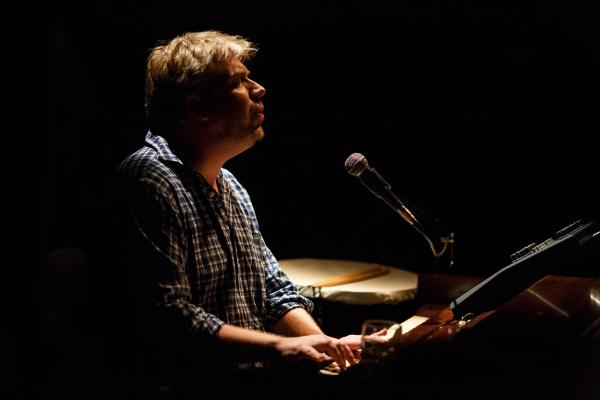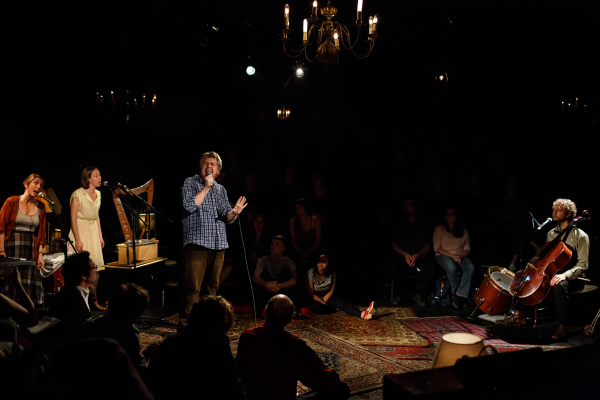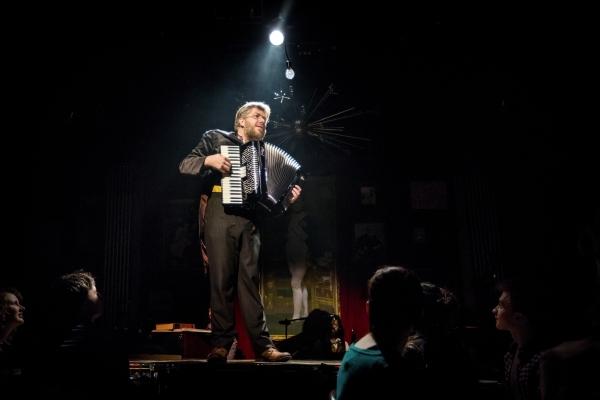Great Comet Creator Dave Malloy on His Whiskey-Soaked Ghost Quartet
Get ready for an unnerving evening at the McKittrick Hotel, the home of ”Sleep No More”.
In a secluded area in the McKittrick Hotel, the specially built location of the haunting immersive theatrical event Sleep No More, four longtime friends are telling spooky stories. Individually, they are Dave Malloy, the creator of the acclaimed War and Peace-inspired electropop opera Natasha, Pierre & the Great Comet of 1812, the cellist Brent Arnold, and singer-songwriters Brittain Ashford and Gelsey Bell. Together, they're Ghost Quartet.
The production, directed by Annie Tippe, has been playing at the McKittrick since January, after an acclaimed run last fall at the Bushwick Starr. Part musical, part concept album, the piece weaves together whiskey and several tales of horror, including Poe's Fall of the House of Usher and others, sung and performed by these four underground talents on instruments ranging from the dulcimer and autoharp to the erhu and metallophone.
Malloy, the show's author, is a singular, ambitious talent in the art of storytelling. Here, he discusses the inspirations behind Ghost Quartet, the pros and cons of immersive theater, and the delicate art of dealing with disruptive audience members.

(© Ryan Jensen Photography)
Can you describe Ghost Quartet?
It's essentially a theatrical staging of a concept album. We're looking at the old rock-and-roll concept albums from the seventies, like Pink Floyd's The Wall. It's similar to that in that there is a narrative, but [it's] quite loose. It's more like a collection of songs that are thematically linked, discussing ghosts from different angles.
Why ghosts?
I grew up reading lots of Stephen King and watching The Twilight Zone and The Outer Limits and Mystery Science Theater 3000. Not even specifically ghosts, but the science fiction, fantasy, horror genres have been close to my heart. All of us [in Ghost Quartet] make this kind of creepy, melancholy, sad music. The next logical thing would be for us to do a ghost story.
How did the show come about?
It was directly inspired by the performers. The four of us are old friends, and all of us are singer-songwriters. The two women in particular [Ashford and Bell], I've loved their voices for a very long time. The four of us were hanging out playing a board game one night and we looked around and said, "The four of us should make a show." I took an inventory of what [instruments] everyone owned and that was our instrumentation.

(© Ryan Jensen Photography)
What is it like to perform a mysterious show like this at the McKittrick, home to the equally creepy Sleep No More?
It's incredible. We couldn't have asked for a better marriage of venue and piece. We premiered the piece at Bushwick Starr last October and had a great run. It was very well received, so we were looking for a place to remount it. Fortunately, one of the producers of Sleep No More came to see it and he invited us in and said "I want you to look at our restaurant." It kind of fell into our laps.
You're no stranger to nontraditional and immersive venues, what with Comet having a tent built especially to house it after the Ars Nova run.
I started in nontraditional venues with a much older show called Beowulf. That show started in a theater but it never worked as well as we wanted to, so then we started doing it in rock clubs. We realized the show worked way, way better at a concert venue.
I asked this question of Philippa Soo and Brittain Ashford about the infamous iPhone-throwing incident at Comet. Can you tell me what it's like when immersive theater goes even more rogue than normal?
With Comet and Ghost Quartet, because we're performing in nontraditional venues, you do get audience members who don't know how to behave. We do have a lot of people on their phones or whispering a lot, which can be distracting. As a performer, it has happened that I have scolded people….Obviously, I can see the merits of both sides. I definitely have had the urge to want to do that myself…But to pick up the phone and throw it? It's a little much.
Tell me about your upcoming show, Preludes, at LCT3.
It's a piece about [composer Sergei] Rachmaninoff and hypnosis. It looks at a three-year period in Rachmaninoff 's life, right after the premiere of his first symphony, which was a bit of a disaster. It was critically panned and the conductor was drunk, and he went into this deep depression right after that and didn't write anything for three years. His wife, in desperation, sends him to a hypnotherapist, right when hypnotism was coming into vogue as a therapeutic method. They work together and out of that he wrote his second piano concerto, which is one of his most famous and beloved works. The music is a blend of my original music, Rachmaninoff's original music, and then some pieces that are hybrids of the two.
Could you see Comet on Broadway, like the rumors say might happen?
Totally. I would love to see that happen. It would require a very particular house, in order to maintain the kind of intimacy we had. But at the same time, we'd expand it enough to fill a Broadway house. But I do think there are ways it could happen.

(© Chad Batka)











